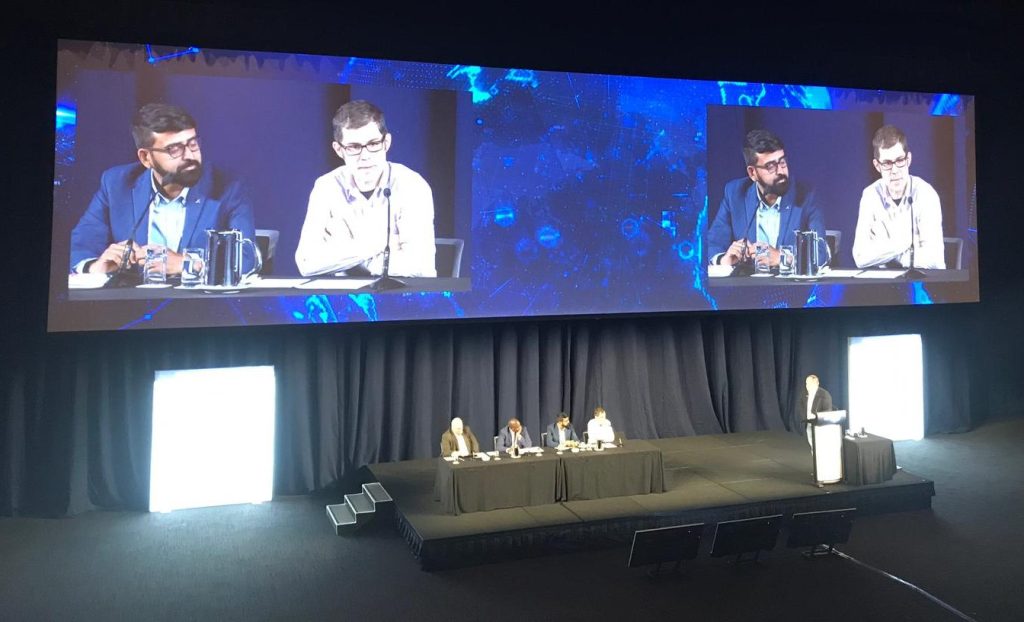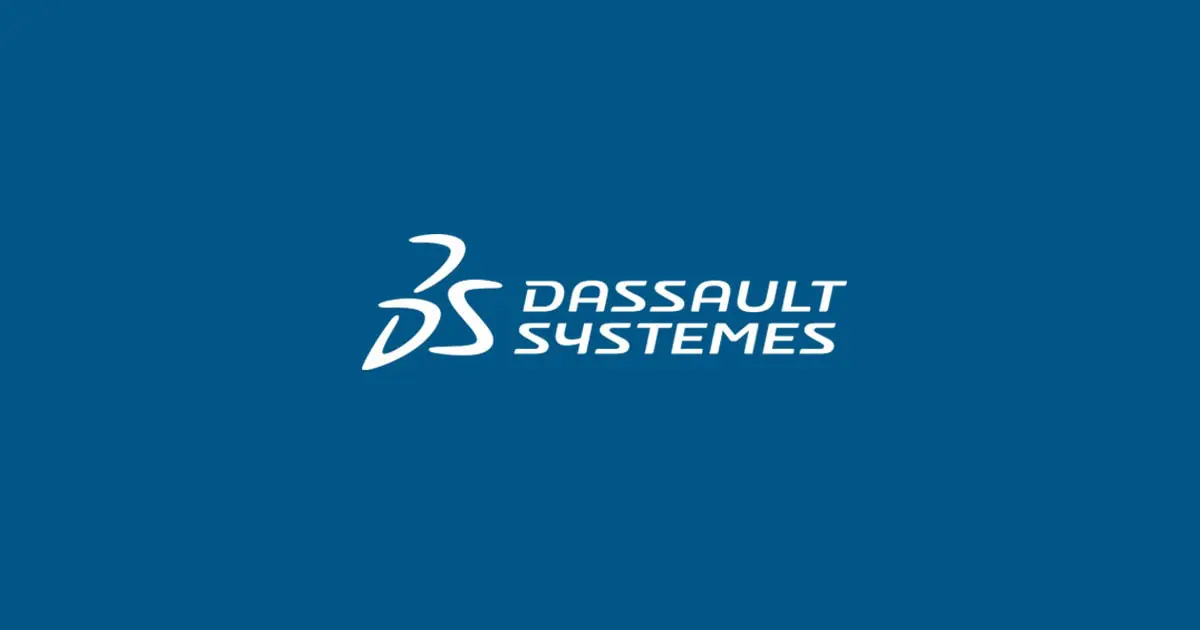
Dassault Systèmes is a member of Austmine, the leading industry body for the Australian Mining Equipment, Technology and Services (METS) sector, and also a proud sponsor of the Austmine Conference 2019 which took place at the Brisbane Convention & Exhibition Centre. Themed “Mining Innovation – The Next Horizon”, the Austmine conference brought together leading mining innovation champions from the industry.
Prashanth Mysore, Dassault Systèmes’ Industry Technical Director, engaged with senior executives from OZ Minerals, Debswana and Rio Tinto at a panel session on “What is the Future of Plant and Processing?” during the conference plenary. Facilitated by Brett Morgan, Director of Austmine, the session addressed the current challenges facing the mining industry and what these mean for plants being commissioned now and into the future.
We bring you a Q&A with Prashanth Mysore following this insightful panel session.
Q1. As we know, mining is currently dealing with a great challenge – quality ore is becoming harder to find and lower grade materials being mined must undergo more intense processing techniques. The outcome is two-fold: lower productivity and greater impact on the environment. What does this mean for processing plants now and into the future?
Companies will continue to adopt and deploy new technologies, be it on existing assets or commissioning new assets integrated with the latest digitalisation practices. Their goal is to achieve reliable and predictable plant performance through connectivity and smart data analytics enabled by technology and IoE (Internet of Experience).

IoT, in the way it is being applied in technology implementation solutions today, is really about the “Internet of Smart Things”. Businesses that take an ‘experience thinking’ approach to production are able to genuinely enhance people’s lives. Mining processing plants which would take this approach will benefit from the rewards of what we call the “Internet of Experiences (IOE)” in the following ways:
- Connectivity: it becomes common practice for companies to embed sensors, actuators and network connectivity in their products, thus realising the fuller potential of connectivity.
- Contextual: as a result of this constant connectivity, the plant can dynamically adapt to changes, thereby enabling operators to obtain contextual data and information for their tasks through immersive experience.
- Continuous: real data can be embedded into decision automation for continuous optimisation of plant operations.
New IoE-based technologies in automation and manufacturing operations management will be necessary investments as mining companies look towards improving productivity and optimising their plants, but enabling people and developing the future workforce is key.

The focus during the current decade is on AI (Artificial Intelligence) learning from the machines. Thanks to IoT, businesses are able to capture essential data and insights to improve their assets and processes, which in turn leads to new insights and new informed actions. This continuously improving digital feedback loop is fed to the machines to teach them how to operate more efficiently. Being able to simulate the process behaviour and operating conditions through IoE platforms allow mining businesses to predict in advance, what will happen to their plant performance under varied scenarios, resulting in less unexpected occurrences during operations.
This is already happening in the aeronautics industry, where pilots are trained through simulators in planes that are controlled in full automatic mode. The same process could be extended to mining plant operations. Finally, technology deployment methodology is key. Having a systematic process to deploy technology and best practices from other industries, like the “smart factory” concept from manufacturing, can empower mining companies to optimise plant performance.

Sustainability is another major factor that is influencing business processes in the mining industry. Mining companies need to figure out how to deliver raw materials as efficiently and sustainably as possible, as quality ore is becoming rarer to find and more intense processing is required on the lower grade ore that is found. Technologies in automation and AI to better streamline the operations of remote plant sites and application of “zero waste” best practices from other industries will be key to minimising the environmental footprint from these more intense processing operations and ensure the sustainable development of the mining business in the long run.
Q2. How are your businesses tackling this productivity and environmental challenge?
Dassault Systèmes solutions on the 3DEXPERIENCE platform have facilitated the digitalisation journeys of a wide range of companies and capital facilities in oil & gas, mining and other industries. This includes developing 3DEXPERIENCE virtual twins of capital facilities to optimise business processes and integrating all stakeholders on a single digital platform to promote collaboration and implement digital continuity across the production value chain.

With the 3DEXPERIENCE virtual twin, plant operators can actually virtually ‘experience’ its performance in different scenarios through simulation, which will yield insights to help them make better decisions and resolve any potential problems through dynamic recalibration of equipment, production lines and systems in the plant. Therefore the 3DEXPERIENCE virtual twin not only significantly enhances reliability and predictive analytics of plant performance, but also saves time, energy and costs by reducing occurrence of unexpected variables.
Sustainable mining is based on excellence in mine design that improves health and safety in mine operations, along with optimising the extraction of the resource and enhancing resource efficiency.
The 3DEXPERIENCE virtual twin, or more importantly, model-based enterprise[1] processes, will not only lead to development of sustainable mine designs, but will also help to manage biodiversity and long-term environmental impacts from mining operations. It empowers mine operators to investigate mine environment performance that will yield opportunities for improvements in energy efficiency, water management, productivity, safety, recycling, environmental management and social responsibility. Our experiences in developing 3DEXPERIENCE city planning models to create smart, safe and liveable cities can be well adopted in the mining industry.
Q3. What innovations in processing currently excite you the most and which technologies do you think have the most potential for positive impact?

The concept of the ‘smart factory’ excites me the most. The ‘smart factory’ can run largely autonomously through AI technology, robotics and data analytics, with the ability to self-correct thanks to the digital feedback loop. The ‘smart factory’ model connects the plant to other entities in the digital supply network, enabling more effective supply chain management. This model has huge potential in helping mining companies address the challenges of workplace health and safety, lean practices, ‘zero waste’ goals and sustainability. Other industries have already embarked on this journey and it is great to see companies in mining and oil & gas starting to deploy the ‘smart factory’ model.
Q4. What skills do we need to deliver the processing plant of the future? How are you building your company’s internal skills?
Field workers will have to become more and more multi-skilled. They will not be assigned anymore to repetitive tasks, which will all be undertaken by cobots – collaborative robots.

Plant operations will become more and more autonomous and machines will notify alerts when they will not be able to know how to behave when they will face new unexpected situations. Field workers will have to intervene only on-demand on asset management and will have to update the behavioural models in the plant processes.
Field workers will have the opportunity to receive training in the virtual environment through immersive reality technology, and will get access in context to any information that might be relevant for their tasks, thanks to augmented reality applications, such as consulting 3D views and work instructions on the same digital platform.
The digital platform and experiential learning will be the workforce of the future enabler. We’ve been investing in technology development for last 3 decades – with the last decade focused on the 3DEXPERIENCE Platform for breaking down silos, connecting dots and democratising the technology.
Developing the “Internet of Experience” through the 3DEXPERIENCE platform, where plant operators can actually ‘experience’ virtually the varied scenarios of their plant performance in a 3DEXPERIENCE virtual twin through immersive and augmented reality, and base their decision-making on the insights from this virtual experience, is the key to build the plant of future.
Q5. Which processing plant, anywhere in the world, do you see as demonstrating best practice? Why?

We have worked with a major Oil & Gas player who have been embarking on best practices in predictive maintenance and application of the 3DEXPERIENCE platform for virtual twin. What stands out is that they haven’t focused just on automation, but on developing a model-based enterprise and adopting best practices from lean manufacturing, continuous worker enablement and the ‘digital worker’ concept from the ‘smart factory’ model.
Q6. Every process plant operation is unique and therefore, one-size fits all technologies or procedures fail in reality. How do you work with partners to help them understand your challenges? Is co-innovating the answer to creating sustainable processing operations?

We work with partners through a tailored, systematic approach, which we call value engagement. It is about assessing a company’s value first. In order to optimise their business processes, we first ask the company what is their immediate need – is it optimising their production process, being able to produce more with less, reduce plant operators’ involvement in hazardous zones, and/or implementing effective cost controls? Conducting a value assessment with a company is key to justify their return on investment and meet their needs, and importantly, to identify a road map for their digitalisation strategy.
For more news and insights on Dassault Systèmes’ mining events in Australia, go to https://events.3ds.com/mining-australia
[1] The model-based enterprise (MBE) is a term used in manufacturing to describe a strategy where a data-annotated 3D model of a product is utilised as an authoritative information source for product lifecycle management (PLM).

